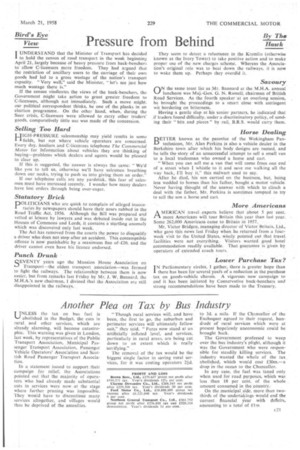Another Plea on Tax by Bus Industry
Page 57

If you've noticed an error in this article please click here to report it so we can fix it.
INLESS the tax on bus fuel is abolished in the Budget, the cuts in rural and other services, which are already alarming, will become catastrophic. This warning was given in London, last week, by representatives of the Public Transport Association, Municipal Passenger Transport Association, Passenger Vehicle Operators' Association and Scottish Road Passenger Transport Association.
In a statement issued to support their campaign for relief, the Associations pointed out that the majority of operators who had already made substantial cuts in services were now at the stage where further pruning was impossible. They would have to discontinue many services altogether, and villages would thus be deprived of the amenities. • "Though rural services will, and have been, .the first to go, the suburban and perimeter services will ultimately follow suit," they Said. "Fares now stand at an artificially inflated level, and services, particularly in rural areas, are being cut down to an extent which is really terrifying." .
The removal of the tax would be the biggest single factor in saving rural services, for it was costing operators 24-cl.
to 3d. a mile. If the Chancellor of the Exchequer agreed to their request, hundreds of rural services which were at present hopelessly uneconomic could be brought back.
The Government professed to weep over the bus industry's plight, although it was the Government who were responsible for steadily killing services. The industry wanted the whole of the tax abolished, which would cost .£30m.--a drop in the ocean to the Chancellor.
In any case, the fuel was taxed only when used for road purposes, which was less than 18 per cent, of the whole amount consumed in the country.
On the municipal side, more than twothirds of the undertakings would end the current financial year with deficits, amounting to a total of El m








































































































